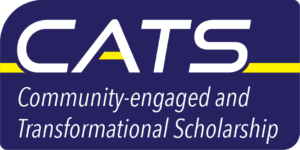
We are pleased to announce that WTI’s Community-engaged and Transformational Scholarship (CATS) program is now a member of the Education Partnership for Innovation in Communities Network (Epic-N), a group of programs that match community-identified needs and projects with the resources, expertise, and human capital of university students.
To become a member, programs must demonstrate that they align with the tenants of Epic-N: respecting existing administrative structures, individual responsibilities, and incentives; creating genuine partnerships with local governments or organizations; intentionally aiming to improve quality of life; focusing on community-identified, -driven, and -evaluated contributions; and catalyzing multi-disciplinary work and high numbers of courses, students, and student hours.
Since its foundation in 2018, CATS has provided hands-on learning experiences for more than 400 MSU students on over 40 projects for the City of Bozeman. The diversity of project needs has facilitated participation from an equal diversity of university disciplines, including geography and GIS, sociology, political science, sustainable foods & bioenergy systems, environmental, chemical, and industrial engineering, architecture, environmental science, film, and horticulture.
To begin a project, interested partners select a community challenge and work with Susan Gallagher, the CATS coordinator, to develop a project outline, budget, and schedule. They also identify an MSU faculty member excited to address the issue with their students. Most projects, such as Community Garden Expansion – Recommendations Based on Case Studies, are completed within a single semester, though projects may be expanded to increase their scope and depth. A notable example is the Investigating Neighborhood Character in the Northeast Neighborhood of Bozeman, MT which built on the work of multiple MSU courses and departments. The final product was a beautiful report documenting the “existing character of the neighborhood and social, economic, and architectural changes as perceived by residents,” and outlining the neighborhood characteristics that should be protected under increasing development pressure.
The success of the CATS program is due, in part, to its rewarding and continuing relationship with the City of Bozeman. Developing additional partnerships with organizations like neighborhood associations, departments of transportation, and counties, will not only support more hands-on learning opportunities for MSU students, but new and innovative solutions for Montana communities. To learn more about past CATS projects and developing partnerships, visit http://wrtwc.org/partnerships/cats/.

